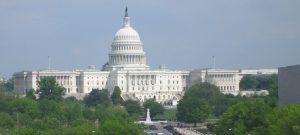
As the deadline approaches for implementing a single set of nationwide hemp-production rules, states and industry associations are pressuring the U.S. Department of Agriculture for a delay, warning the federal agency that several states won’t meet the deadline.
But so far, the feds don’t seem inclined to budge.
Nearly half of U.S. states cultivating hemp this year are doing so under less-restrictive 2014 regulations that were grandfathered for a year when the USDA finally set down a national framework last fall. The grandfather period ends Oct. 31 – right in the middle of the harvest in some places.
But several large hemp-producing states – including Kentucky, Oregon and California – are operating under the 2014 Farm Bill authority. And states have until Saturday to submit acceptable plans if they want to continue overseeing their own hemp industries. Colorado, another big hemp producer, submitted a plan to the USDA on June 18 for approval, but they’re still waiting for an answer, said Brian Koontz, the state’s industrial hemp manager.
Koontz said the USDA has 60 days to respond, so Colorado should have an answer by Aug. 17 or Aug. 18.
It remains unclear how states will transition to new rules mid-season and how the USDA will enforce regulations state by state. But two U.S. senators have asked the USDA to delay the IFR until several concerns from states are addressed, including:
- More disposal options for non-compliant crops.
- Requiring growers to test plants within 15 days of anticipated harvest.
- Farmers possibly facing criminal charges if their plants have more than 0.3% THC. The plants would have to be destroyed and if the plants test at 0.5% THC or more, growers can be criminally liable.
Industry groups and some state departments are also trying to suggest changes to the rule before the public comment period ends and the regulations become final on Oct. 31, 2021.
“These are things that do not take a legislative fix, but they are things that could be addressed through rule-making. So it’s very important that collectively we are conveying our concerns,” said Courtney Moran, chief legislative director for Agricultural Hemp Solutions.
Mixed messages from Washington
U.S. Sen. Chuck Schumer, the top-ranking Democrat in the Senate, sent a letter on Aug. 7 asking the USDA to delay the rules until 2022.
“Regulating this rapidly-emerging industry is a must, but the timing of new regulations is important and the current economic crisis must be considered,” Schumer said.
The National Association of State Departments of Agriculture and the National Industrial Hemp Council made a similar cry last week, arguing that states have been unable to draft plans to align to the new rules – but not for a lack of trying.
“Many states were able to transition from their hemp pilot programs to a USDA state approved plan,” the groups wrote in an Aug. 5 letter to Congress.
“Notwithstanding this progress, many states will be unable to meet the forthcoming deadline of October 31, 2020,” the letter read. “These states have cited that due to the unprecedented national COVID-19 pandemic, state regulators have been unable to work with their state legislatures to acquire necessary statutory amendments.”
The U.S. House recently passed legislation that would delay the deadline until 2022. But the bill still needs Senate approval, and it’s uncertain whether it could happen in time.
The USDA, however, is indicating it will move forward with its new rules. The agency told Hemp Industry Daily by that the deadline to legally operate under 2014 rules remains unchanged.
“The provisions of the 2014 Farm Bill expire on Oct. 31, 2020,” an agency spokesman wrote. “After that time, all domestic hemp must be grown under either an approved state or tribal plan or under a USDA hemp production plan in states or tribes that have chosen not to operate their own plan.”
Case study in Oregon
For a sense of how the looming deadline is complicating matters in large hemp-growing states, look to Oregon, which has a thriving industry of hemp growers specializing in flower production under 2014 rules.
Starting this fall, the state will have to perform background checks on growers.
State officials tried to get legislative approval for that, but legislative negotiations broke down each of these last two sessions and nothing was done about it, said Sunny Summers, who coordinates cannabis policy and special projects at the Oregon Department of Agriculture.
Summers said the state was working on a draft plan to submit to the USDA by Saturday’s deadline. She said she hopes the new rules take effect in January, not on Nov. 1.
“Our licenses and registrations are good through the calendar year,” Summers said. “And so making the change Nov. 1st is not a good way to operate a program. So I’m just going to be honest, that’s really confusing for people in the industry when they’re kind of struggling to figure out which end (is) up.”
Summers said she’s also concerned about farmers opening themselves to criminal prosecution if their crops test above the THC limit for hemp.
“There is a large percentage of hemp growers that are new to farming at all, much less, this particular crop with its own specific nuances,” she said. “And so penalizing people, who in all good faith were trying to grow hemp, because they tested at 0.5% or above doesn’t seem reasonable to us.”
Ivan Moreno can be reached at [email protected]

